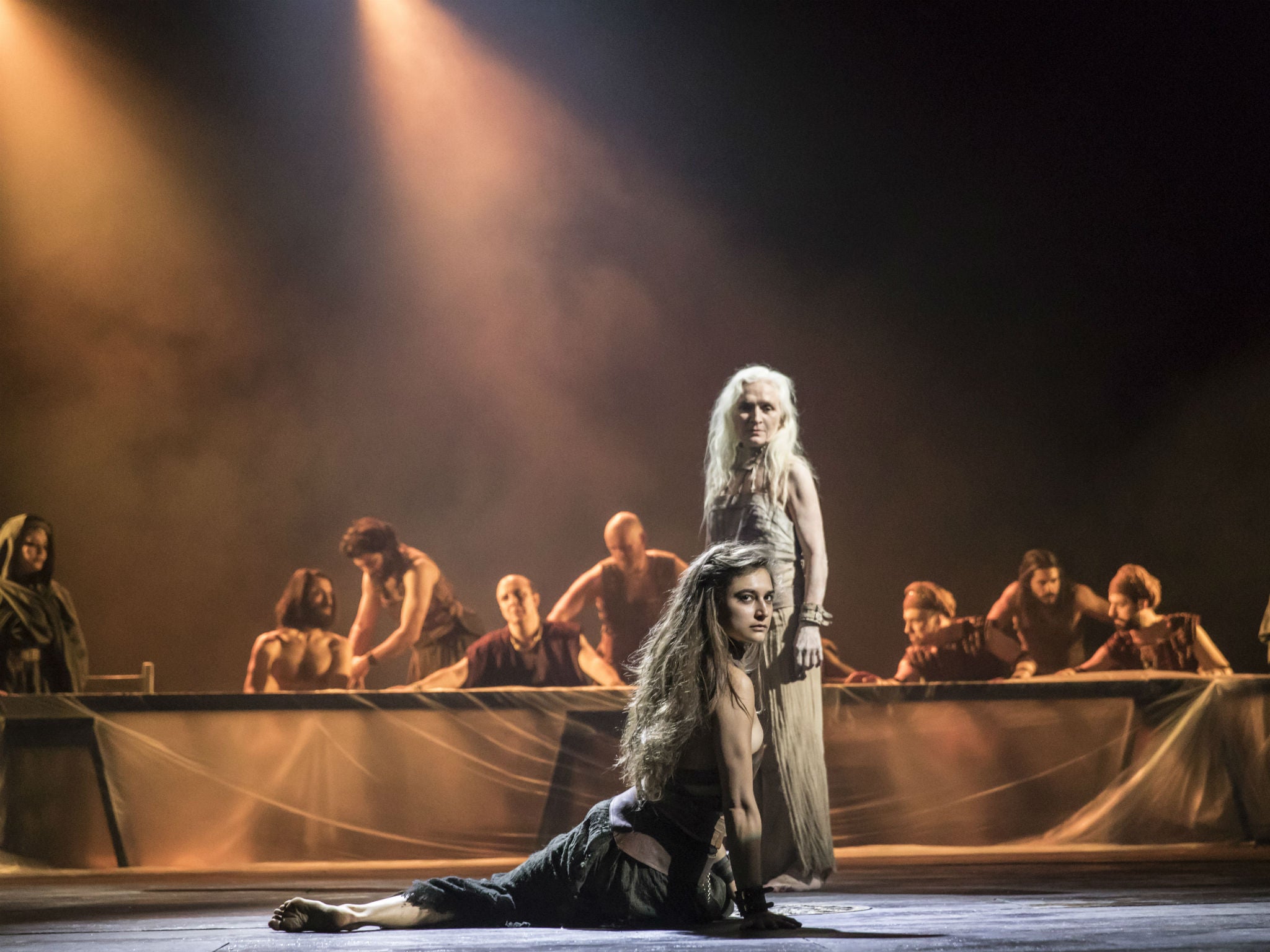Salomé, National Theatre, review: It's forever on the verge of toppling into bathos
Yael Farber, who also directed the Old Vic revival of ‘The Crucible’ and the NT’s ‘Les Blancs’ last year, still proves that she does riveting ritual intensity better than anybody else

South African director Yael Farber sees the story of Salomé as typifying the kind of “erasure” that can be inflicted upon difficult figures, for whom the written evidence is patchy and conflicting, when they satisfy the needs of much later artists and take on a dubious mythic status in the popular imagination.
Her new show in the Olivier is defiantly revisionist – the result of her registering that so much of Salomé's reputation as a femme fatale rests on subsequent invention. The niece/stepdaughter of Herod who demands and gets the head of John the Baptist has become a byword for warped sensuality. But the New Testament accounts don't even identify her by name and emphasise the importance of her mother's grudge against the Baptist, and while making mention of dancing, don't refer to any Dance of the Seven Veils. It's no surprise to learn that this current project began as an adaptation of Oscar Wilde's fin de siècle symbolist play (soon to be revived by the RSC), which floats and fixes a vision of Salomé as motivated by perverse and frustrated desire, her act one of sexual vengeance.
So far, so good. You can imagine a tightly written play that debunks the influence of male fantasy on the cultural afterlife of this figure. You can envision a piece that proposes a counter-myth – Salomé as a woman who has been written out of the record of insurgency against Roman rule in Judaea, her act an extraordinary political gesture designed to ignite a revolution amongst John the Baptist's followers. And you can conceive of a show that chooses a deliberately severe aesthetic in order to distance itself from the clammy cliches of Biblical representation as it forensically interrogates its own procedures. But while Salomé has those ideological ends in mind, it chooses to try to undermine the received version from within its own take on the overblown, ritualistic manner of the previous myth-makers.
It is true that nobody does riveting ritual intensity better than Farber, as betokened by her Old Vic revival of The Crucible and her superb account at the NT last year of Les Blancs, Lorraine Hansberry's 1965 play about the acrimonious legacy of colonial rule in Africa. Here again she has the measure of the Olivier's epic stage. She fills it with sensuous imagery (the ceremonial pouring of sand; the wafting of rich fabrics) and slow-moving figures as from a frieze. Tim Lutkin’s beautiful lighting design flushes the darkness with a deep amber haze and the air resonates with chimes and liturgical wailing from outset when the two Women of Song release the younger so-called Salomé (Isabella Nefar) from her disregarded remains under a sheet of polythene.
The trouble here is that the proceedings are forever on the verge of toppling into bathos. The action is monitored by the ageing Salomé, called Nameless, played by a crouched, wild-eyed Olwen Fouéré who is required to editorialise about the girl’s status (“citizen, foreigner, refugee”) and the fate-in-waiting for her in portentous, bludgeoningly insistent tones that veer into parody.
The Syrian-French actor Ramzi Choukair is disconcerting as the wild, half-naked Jokanaan (aka the Baptist), issuing his challenges to the compromised clergy in a middle Eastern tongue and joining Nefar's Salomé in a very unsettling ecstasy of cracked-soulmate mutual politicisation in the evocatively staged scene where she descends to his cistern-prison.
For my taste, though, the deconstruction does not go far enough and the production ends up feeling a tad complicit with the suspect kitsch that gave rise to the prejudiced view of the protagonist. Something leaner and more acidic is called for. In my view, a miscalculation.
Join our commenting forum
Join thought-provoking conversations, follow other Independent readers and see their replies
Comments
Bookmark popover
Removed from bookmarks